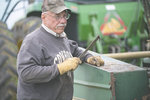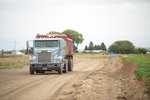Cloudy, 48° F
In recent years, area sugar beet growers have had to overcome the one-two punch of low sugar prices and problems at the factory in their chase of bottom line success.
You can add a third hurdle …
This item is available in full to subscribers.
The Powell Tribune has expanded its online content. To continue reading, you will need to either log in to your subscriber account, or purchase a subscription.
If you are a current print subscriber, you can set up a free web account by clicking here.
If you already have a web account, but need to reset it, you can do so by clicking here.
If you would like to purchase a subscription click here.
Please log in to continue |
|







In recent years, area sugar beet growers have had to overcome the one-two punch of low sugar prices and problems at the factory in their chase of bottom line success.
You can add a third hurdle this year: weather impacts.
It’s been a testing growing season for Western Sugar Cooperative beet growers in the Lovell Factory District. As beets started coming out of the ground in the September start to the sugar harvest, the area crop was clearly behind.
ROUGH SPRING START
“Our spring was horrendous,” said Heart Mountain beet grower Ric Rodriguez, vice president of the Western Sugar Cooperative board of directors.
Many beets were planted late in cool, wet weather.
Some had to replanted when they froze.
The summer heat never really materialized to give the crop the boost it needed.
And then there was hail. The crop was already behind when fields were pounded in “hail alley” in mid-July.
Rodriguez said the July 14 hail hit in the East Willwood area, traveled through the center of the Willwood farmland and then roared north over the Shoshone River west of Powell to an area just past Lane 9 — pelting about 1,800 acres of beets. On July 15, another hail storm struck Emblem Bench and clipped about 500 acres of beets. A third small storm east of Powell a week later dropped more hail.
All in all, around 2,500 acres of beets, or 15 percent of the crop, was affected by the hail.
“It was an odd weather year,” Rodriguez said. “We [Western Sugar] don’t have hail every year, but we had hail in all four of our factory areas this year — Billings and Lovell in the north and Scottsbluff, Nebraska, and Fort Morgan, Colorado in the south.”
The hailed beets are not necessarily lost, but they are set back.
“Beets are resilient,” Rodriguez said. “Sometimes they will recover. Sometimes they won’t.”
“The beets are set back because they try to repair damage to the leaves, which stops root growth,” he added. “That affects the yield and the sugar.”
CROP CLEARLY BEHIND
No surprise, the co-op’s July sampling showed the crop to be behind. The tests were computed to project an average yield for the Lovell district of about 25 1/2 tons to the acre for 2019. This would be a drop from the 2018 harvest numbers which registered an average of 29 tons to the acre.
But the situation pre-harvest is fluid, just like the weather. The early dig only captures 15 percent of the beets. It wraps up in the first week of October. The regular harvest over the entire district begins on Oct. 6.
In the early dig, which started Sept. 14, growers are required to deliver 3.75 tons per contracted acre. That translates to 375 tons of beets for a 100-acre grower.
“To put things in perspective, last year we delivered 6 tons per contracted acre in the early dig. The 3.75 tons this year shows how short the crop will be. It’s all weather-related,” Rodriguez declared.
HOLD THE RAIN
Can the beets make a late comeback? Weather, of course, is the key.
The wet, cold pattern that accompanied the start of the early dig was not the weather growers hoped for.
Rain has posed a start-and-stop early harvest for many growers.
“Every time we get going, we get more rain, and muddy fields have stopped some guys. Plus, the piling grounds get too slick to pile,” Rodriguez said. “But we’ve had enough beets to keep the factory going, and the early yields have been decent.”
Most growers have been able to deliver their allotted 3.75 tons of beets in the early dig.
There has been no modification of the schedule to start the full, regular harvest on Oct. 6.
The price of sugar going into the 2019 harvest has stabilized, Rodriguez said. He gave credit to passage of the Farm Bill last year. Provisions in the Farm Bill rein in the import of cheap foreign sugar that has in the past depressed domestic prices.
“Prices are stable. They’re pretty good,” Rodriguez said, then quickly added that cuts both ways. “We stabilize prices, but we don’t get any high spike in prices either.”
FACTORIES ARE KEY
Western Sugar Cooperative has poured money into modernizing its sugar refining operations at four factory locations in the four-state region — Lovell (Wyoming), Billings (Montana), Scottsbluff (Nebraska) and Fort Morgan (Colorado).
Factories ran better as a result in 2018, but smoothing out the factory operations is an ongoing process, Rodriguez said.
Lovell had a few hiccups. Billings had some problems.
“And when you must slow down the factory operation, you run longer and you incur additional expense at the end of the year,” Rodriguez said. “We’re pretty confident Lovell will run better this year. We’ve got a good manager there. Our factories have got to run better.”
At the co-op’s Fort Morgan factory, environmental issues were behind a change from coal-fired boilers to natural gas. Major upgrades were completed two years ago at the Scottsbluff factory, and the meshing of old and new equipment is still an ongoing challenge.
“It’s true across the industry at sugar refineries,” Rodriguez said. “There’s a shortage of experienced workers, and there’s a learning curve involved when you bring on inexperienced people.”
TORRINGTON FACTORY CLOSED
Western Sugar’s factory at Torrington was closed early this year, part of the plan by the co-op when upgrades were made at the Scottsbluff and Fort Morgan plants. Torrington area sugar beets are processed at Scottsbluff just across the border.
Rodriguez acknowledged that Western Sugar got something of a black eye in the area when the Torrington factory was shut down, costing jobs. It was a business decision, he said. The Torrington plant needed a lot of expensive capital investment.
“We still have a bagging operation at Torrington,” Rodriguez noted. “We still have a presence there.”
Western Sugar packages the 4-pound bags for supermarket shelves under about 15 to 20 different labels in its Torrington bagging operations. The Lovell factory doesn’t do any small bagging. Lovell is a bulk operation with sale of sugar to industrial customers.
North Powell sugar beet grower Tod Stutzman is a new member of the Western Sugar Cooperative board of directors.
Stutzman replaced Lyle Bjornestad of Powell as a Wyoming representative on the nine-member board. Each state has two directors on the co-op board, with an additional director from Colorado. Ric Rodriguez, vice chair of the board, is Wyoming’s other director.
The sugar company cooperative operates in the four-state region of Wyoming, Montana, Nebraska and Colorado.